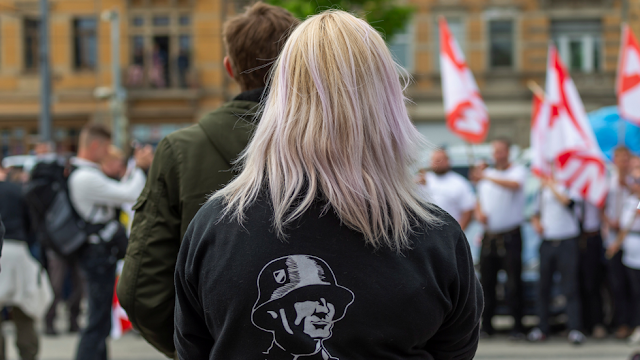Push for transparency? Police in western German state
to reveal suspects' nationality in all crimes
North Rhine-Westphalia's police officers are seen in Cologne, Germany, on October 15, 2018.
© AFP/ DPA / Oliver Berg
Police in the German state of North Rhine-Westphalia will name all suspects' nationality as a way to counter "clumsy deception." The move comes after allegations of police and media covering up criminals' origins.
All future police press releases in Germany's most populous state will contain information about the nationality of suspects as long as it can be determined beyond doubt, the regional Interior Ministry told the German media, adding that it is developing a new set of regulations for the police.
"I have been promoting transparency ever since I took office," regional Interior Minister Herbert Reul, who assumed office two years ago, told journalists, explaining that the new rules would cover both German and foreign suspects.
Current German policy
Current police transparency regulations state that the nationality of suspects, particularly those belonging to a "minority" group, can be revealed only if it is essential in understanding the motives or has a direct link to the crime.
Police officers' reluctance to reveal suspects' nationalities has often landed them in hot water amid rising tensions in Germany in the wake of a massive influx of migrants and refugees. Police have been accused of covering up the countries of origin of foreign suspects to downplay the negative effects of Chancellor Angela Merkel's 'open doors' policy at the height of the 2015 refugee crisis.
Law enforcement officials particularly faced a wave of public outrage in the wake of reports of mass sexual assaults on New Year's Eve in 2015 in Cologne – North Rhine-Westphalia' largest city. The initial police report on New Year's Eve in Cologne failed to mention that many of the suspects were of North African origin, which later drew accusations of a deliberate cover-up.
The latest move is not just a "push for transparency," as it is also aimed at combating speculation involving any future high-profile cases in society, which still remains polarized over the issue of migrant crime.
"I am convinced that this transparency is the best way to combat political hoaxes," Reul said. According to the 2018 crime statistics released by the German Federal Police in April, only slightly more than one-third of all suspects were non-German citizens, while refugees and asylum seekers accounted for 14 percent.
German authorities registered over 8,600 'right-wing extremist offences' in the first half of 2019.
That's 900 more than during the same period in 2018. https://youtu.be/WC3oss9YSe4
There is no doubt that the German policy of hiding the nationalities of criminals has contributed significantly to the growth of far-right extremism in the country. The appearance that the police and media are protecting migrants at the expense of German citizens, especially young, German girls, leaves many Germans thinking they have to take care of their own family's safety because the police, media and justice systems are more concerned with the welfare of criminal migrants than ordinary German citizens. It is not hate as much as it is fear. It's a sorry country where truth has to be hidden.
This initiative was met with skepticism by other German states. Lower Saxony's interior minister, Boris Pistorius, said he sees no reason to change existing practices that protect minorities and prevent "generalizations and inadmissible conclusions."
This is not very bright. How does hiding the truth prevent "generalizations and inadmissible conclusions"? If anything it will contribute to such things as many people will just assume certain criminal activities are associated with migrants.
"Naming the nationalities of the suspects in all cases, even if they are irrelevant to the nature of the offense, does not lead to more transparency," he said in a scathing rebuke to his colleague. "There is no added value in a police statement if it names a suspect a foreign national, while his family lived in Germany for two generations or… is a dual national."
Other German states, where naming suspects' nationality by the police is either forbidden or only allowed in "exceptional cases," also said they have no plans to follow North Rhine-Westphalia's example.
The German Press Council – an umbrella organization of various media associations – cautiously welcomed Reul's initiative, but said that the decision to reveal a suspect's nationality should essentially be left in the hands of the media instead.
"A decision about whether nationality is relevant for the report should be carefully considered and taken by each editorial staff on the basis of their ethical principles. No authority should and can decide that," the council's spokesman, Volker Stennei, said.
Migrant crime has long been a hot topic in Germany, where any high-profile case involving a non-German suspect risks reigniting simmering tensions. Recently, the death of a young boy at the hands of an Eritrean who pushed him and his mother under a high-speed train rekindled the migration debate and even forced Federal Interior Minister Horst Seehofer to call for calm and advise Germans against drawing "premature" conclusions.
North Rhine-Westphalia



No comments:
Post a Comment